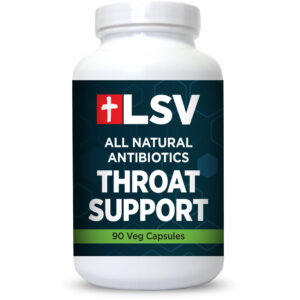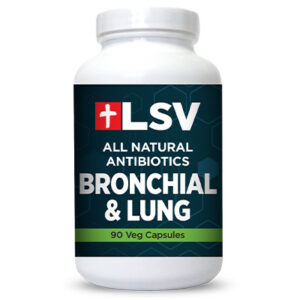Our Company
LSV
SINCE 1992
Founded in 1992, in Winter Park, Florida – LSV Vitamins has been the leader in All Natural Antibiotic supplement sales for over 30 years in the United States.

Burdock Root: Powerful Potential as a Natural Anti-inflammatory Ally
Burdock root, a common herb with a long history of use in traditional medicine, is gaining renewed interest for its potential health benefits. Among these, its possible anti-inflammatory properties are a subject of ongoing research. While not a replacement for conventional treatments, burdock root offers an intriguing glimpse into the world of natural approaches to inflammation management.
A Rich Arsenal of Antioxidants
Burdock root boasts a unique profile of compounds, including phenolic acids, lignans, and inulin. These compounds contribute to burdock root’s antioxidant properties [1]. Antioxidants help combat free radicals in the body, which contribute to cellular damage and are linked to various chronic diseases, including inflammatory conditions. By neutralizing free radicals, burdock root’s antioxidants may indirectly help manage inflammation.
Promising Studies Show Reduced Inflammatory Markers
Several studies suggest burdock root may offer anti-inflammatory benefits. Research focusing on burdock root extracts has shown promise in reducing inflammatory markers in the blood [2]. A study published in the journal “Biomedicine & Pharmacotherapy” found that burdock root tea consumption led to improvements in inflammation markers for participants with knee osteoarthritis [3]. This indicates that burdock root may play a role in managing inflammatory conditions.
Unveiling the Mechanisms: A Work in Progress
The exact mechanisms by which burdock root exerts its anti-inflammatory effects are not fully understood. More research is needed to pinpoint the specific compounds responsible and how they work within the body to modulate inflammation.
Important Considerations and the Need for More Research
While the initial research on burdock root’s anti-inflammatory properties is encouraging, there are important factors to consider:
Burdock Root: A Complementary Approach
Based on current research, burdock root shows promise as a natural approach to inflammation. However, it should not be seen as a replacement for medication prescribed by a doctor.
Exploring Burdock Root Responsibly
If you’re considering using burdock root for inflammation, consulting your doctor is essential. They can assess your individual needs and advise you on whether burdock root is a suitable option and recommend appropriate dosages. Burdock root comes in various forms, so discussing the best option for you is crucial.
The Future of Burdock Root in Inflammation Management
As research on burdock root progresses, we may gain a deeper understanding of its potential role in managing inflammation. Future studies may shed light on optimal dosages, specific applications for different inflammatory conditions, and the exact mechanisms by which burdock root exerts its anti-inflammatory effects.
Burdock Root is one of the 14 ingredients in all of our All Natural Antibiotic line: See Below:
LS Vitamins – Since 1992
See All of our effective All Natural Products Here
All Natural Antibiotics Cold & Flu
All Natural Antibiotics Sinus Support
All Natural Antibiotics Teen Support
All Natural Antibiotics Tooth & Gum
All Natural Antibiotics Bronchial & Lung Support
All Natural Antibiotics Throat Support
The possibility of antibiotic side effects can be frightening, but it is important to remember that their proper use has saved countless lives. Those using antibiotics should report any possible negative reactions to their doctor immediately. In some cases, doctors will have their patients continue using a specific antibiotic if the side effects are mild; in others, the doctor will switch the patient to another drug.
For Over 30 Years, we have 3rd Party Tested each and every nutrient that go into all of our products: Purity & Effectiveness is how are our product continually works for Tens of Thousands of our Customers.
By no means are we at LSV Vitamins saying do not take what your doctor prescribes, we are just saying that we have an alternative for those who cannot take Antibiotics, afraid one of the many side effects, or simply want to try an all-natural alternative. We have a large number of people (over 100,000) who take and have taken this at the first sign of a problem, and it works well. As always, consult your doctor.
Studies Referenced:
Disclaimer: None of the above statements have been evaluated by the FDA. These products are not intended to diagnose, treat, cure or prevent any disease. As always, consult your physician before taking any supplements. LSV. Individual results may vary*
 Throat Support - Natures Antibiotics
Throat Support - Natures Antibiotics
 Bronchial & Lung Support - Natures Antibiotics
Bronchial & Lung Support - Natures Antibiotics
LSV
SINCE 1992
Founded in 1992, in Winter Park, Florida – LSV Vitamins has been the leader in All Natural Antibiotic supplement sales for over 30 years in the United States.